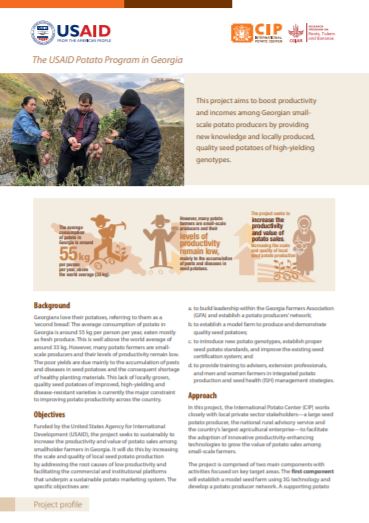The event marks the launch of the USAID Potato Program in Georgia, implemented by the International Potato Center (CIP).
Over the next three years, USAID will partner with CIP to increase the value and productivity of potato sales among smallholder farmers in Georgia. Despite Georgians’ love for potatoes—their “second bread,” as they call it—productivity levels remain low in the country due both to pests and diseases in seed potatoes and a lack of healthy planting materials. The USAID Potato Program in Georgia project will address the root causes of this problem by working with smallholder farmers and extension professionals to ensure proper training and knowledge dissemination of new types of seed potato. CIP will work with potato researchers and private sector businesses to develop a viable seed potato sector.
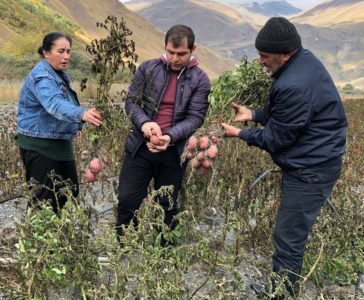
Working closely with national researchers and public certification officials, local “model farmers” will learn how to apply integrated seed health (ISH) protocols. Approximately 1,500 local farmers will be invited to farmer demonstration events for training on good agronomic practices to help them improve their productivity levels. These events are expected to increase knowledge of good practices as well as demand for these new varieties. Participating farmers are expected to improve their annual sales per hectare from USD 4,500 to nearly USD 15,000—an increase of 233%. The enhanced access to improved seed potato is expected to increase farmer yields from an average of 12–25 tons/hectare.
This approach will be accompanied by the creation of a potato producer network responsible for the dissemination of improved varieties and technologies. The network will work closely with the newly formed Potato Council, which will undertake advocacy activities with key stakeholders from parliament, ministries, business sector, and other groups to ensure the introduction of more resilient and higher yielding potato varieties. One of the key expected outcomes will be approval by the Ministry of Environmental Protection and Agriculture of the seed potato certification process and standards in Georgia. Moreover, 50% of the potato seed farmers participating are expected to become certified quality seed producers. These farms will in turn provide improved seed potatoes to approximately 15,000 smallholders, worth approximately USD8.7 million a year.
The event will be broadcast in English and Georgian.
Working closely with national researchers and public certification officials, local “model farmers” will learn how to apply integrated seed health (ISH) protocols. Approximately 1,500 local farmers will be invited to farmer demonstration events for training on good agronomic practices to help them improve their productivity levels. These events are expected to increase knowledge of good practices as well as demand for these new varieties. Participating farmers are expected to improve their annual sales per hectare from USD 4,500 to nearly USD 15,000—an increase of 233%. The enhanced access to improved seed potato is expected to increase farmer yields from an average of 12–25 tons/hectare.
This approach will be accompanied by the creation of a potato producer network responsible for the dissemination of improved varieties and technologies. The network will work closely with the newly formed Potato Council, which will undertake advocacy activities with key stakeholders from parliament, ministries, business sector, and other groups to ensure the introduction of more resilient and higher yielding potato varieties. One of the key expected outcomes will be approval by the Ministry of Environmental Protection and Agriculture of the seed potato certification process and standards in Georgia. Moreover, 50% of the potato seed farmers participating are expected to become certified quality seed producers. These farms will in turn provide improved seed potatoes to approximately 15,000 smallholders, worth approximately USD8.7 million a year.

Peter Wiebler
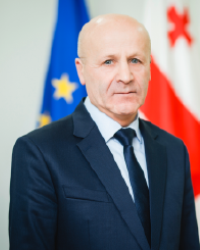
Yuri Nozadze
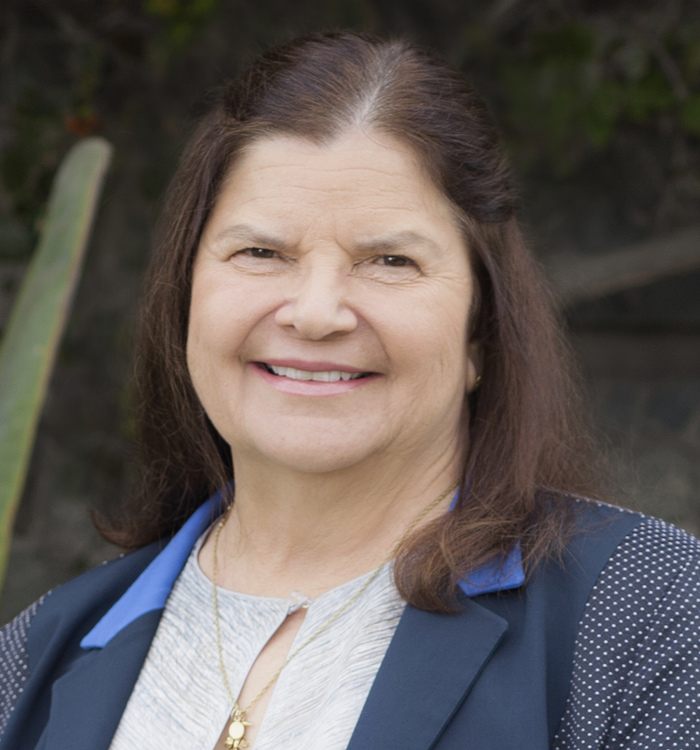
Barbara Wells

Rusudan Mdivani
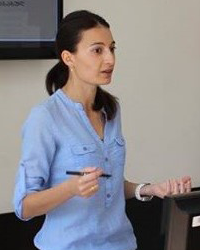
Maia Nizharadze

David Tsiklauri
Facilitated by Maia Nizharadze, CoP, USAID Potato Program in Georgia
| 16:00 | Yuri Nozadze, Deputy Minister, Ministry of Environmental Protection an Agriculture of Georgia – The importance of potato productivity for farmer incomes, the economy and food security |
| 16:05 | Peter Wiebler, Mission Director, USAID – An importance of Georgia and potato to USAID long-term goals |
| 16:10 | Barbara Wells, Director General, International Potato Center – CIP’s global strategy and how Georgia fits in |
| 16:15 | Maia Nizharadze, CoP, USAID Potato Program in Georgia – The USAID Potato Program in Georgia: potential achievements |
| 16:20 | A virtual tour of the in-vitro laboratory in the Seed Model Farm in Akhaltsikhe, Rusudan Mdivani, Principle Investigator, USAID Potato Program in Georgia |
| 16:30 | Closing remarks, David Tsiklauri, project AOR, Senior Private Sector Development Advisor, Office of Economic Growth, USAID |


